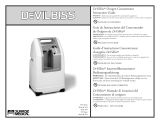
15
NOTE At 80 MHz and 800 MHz, the higher frequency range applies.
NOTE These guidelines may not apply in all situations. Electromagnetic propagation is affected by
absorption and reflection from structures, objects, and people.
NOTE UT is the a.c. main voltage prior to application of the test level.
a: Field strength from fixed transmitters, such as base stations for radio (cellular/cordless) telephones and land
mobile radios, amateur radio, AM and FM radio broadcast and TV broadcast cannot be predicted theoretically with
accuracy. To assess the electromagnetic environment due to fixed RF transmitters, an electromagnetic site survey
should be considered. If the measured field strength in the location in which the concentrator is used exceeds the
applicable RF compliance level above, the concentrator should be observed to verify normal operation. If abnormal
performance is observed, additional measures may be necessary, such as re-orienting or relocating the device.
b: Over the frequency range 150 kHz to 80 MHz, the field strengths should be less than 3V/m.
Recommended Separation Distances between Portable and Mobile RF Communications
Equipment and This Device:
This concentrator is intended for use in an electromagnetic environment in which radiated RF disturbances are
controlled. The user of the concentrator can help prevent electromagnetic interference by maintaining a minimum
distance between portable and mobile RF communications equipment (transmitters) and this concentrator as
recommended below, according to the maximum output power of the communications equipment.
150 kHz to 80 MHz
d=1.2√P
0.12
0.38
1.2
3.8
12
0.12
0.38
1.2
3.8
12
0.23
0.73
2.3
7.3
23
0.01
0.1
1
10
100
80 MHz to 800 MHz
d=1.2√P 800 MHz to 2.5 GHz
d=2.3√P
Separation Distance According to Frequency of Transmitter (M)Rated Maximum Power
Output of Transmitter (W)
For transmitters rated at a maximum output power not listed above, the recommended separation distance d in
meters (m) can be estimated using the equation applicable to the frequency of the transmitter, where P is the maxi-
mum output power rating of the transmitter in watts (W) according to the transmitter manufacturer.
Guidance and Manufacturer’s Declaration – Electromagnetic Emissions
The concentrator is intended for use in the electromagnetic environment specified below. The user of the
concentrator should assure that it is used in such an environment.
NOTE At 80 MHz and 800 MHz, the separation distance for the higher frequency range applies.
NOTE The guidelines may not apply in all situations. Electromagnetic propagation is affected by
absorption and reflection from structures, objects, and people.
Emissions Test Compliance Electromagnetic Environment - Guidance
RF emissions
CISPR 11 Group 1 The concentrator uses RF energy only for its internal function.
Therefore its RF emissions are very low and not likely to cause any
interference in nearby equipment.
RF emissions
CISPR 11 Class B The concentrator is suitable for use in all establishments, including
domestic establishments and those directly connected to the public
low-voltage power supply network that supplies buildings used for
domestic purposes.
Harmonic Emissions
IEC 61000-3-2 Class A
Voltage fluctuations
/ flicker emissions
IEC 61000-3-3
Complies




















